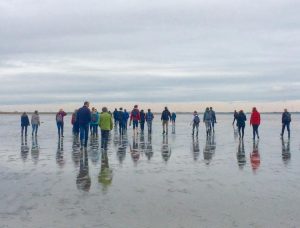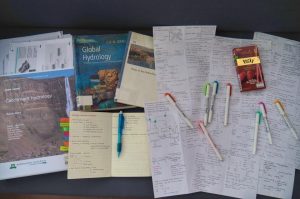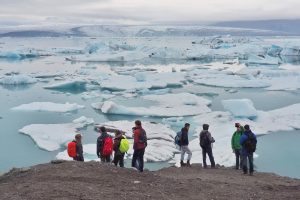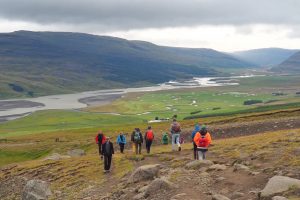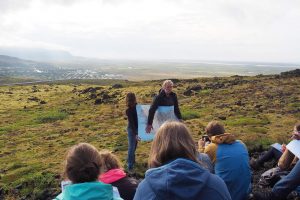A ‘blue’ study at Wageningen University & Research
Located among the Dutch croplands and cows, Wageningen University and Research (WUR) is world-class in living-organism studies (microorganisms, plants, animals, and human-beings) with applications in agriculture, food industries, and others. Wageningen itself is known as ‘the city of life sciences.’ Many students from around the world come to join these study programs, which I secretly name them the ‘green’ studies. They remind me of the green building-shaped sign on the WUR logo (as you can see in the top left corner of this page). However, WUR offers several more study fields that are all helpful in improving the quality of life. This article is about a ‘blue’ study, which is neither into plants nor food. Scroll back to the blue colour on the WUR logo, don’t you think it looks like water? I will take you on a journey of my master degree that specialized in the “Hydrology and Water Resources.”
Hydrology – the logic of water
“Have you ever wondered how farmers can grow and water their maize in the arid region or how city governors can warn their citizens for impending flooding?”
Hydrology is a branch of the earth or environmental science that focuses on ‘water.’ Starting when it rains or snows, water is circulated on earth. Some water is kept by plants or in soils, of which some amounts are percolated further to the groundwater. Some water flows into rivers or lakes. Some evapo(transpi)rate back to the air. Hydrology concerns the movement, distribution, and properties of all available water in relation to land and atmosphere.
Hydrologists apply their scientific knowledge and skills to solve a wide range of water issues.
Many people have a picture of hydrologists dealing with polluted rivers in mind. In fact, hydrologists apply their scientific knowledge and skills to solve a wide range of water issues. Have you ever wondered how farmers can grow and water their maize in the arid region or how city governors can warn their citizens for impending flooding? The work of hydrologists is a combination of field surveys, laboratory experiments, mathematical calculation, and computer modelling to manage water resources (which are often too much or too little at a time). In the current world that becomes more vulnerable under climate change, tackling water-related hazards is a real challenge from the local to global scale.
Water in life sciences
“Wherever we find water, whether it is just a pond or the ocean, we can be sure to find life.”
Yes, water is lifeless, but life forms are usually made of water. Plants and animals need water to survive. Even our human bodies are more than 60% water. H2O is an essential component of a cell to the universe. NASA has been seeking for the other ‘Earth’ and extra-terrestrial life by tracking water. Wherever we find water, whether it is just a pond or the ocean, we can be sure to find life.
Hydrologists have an important role in simulating, forecasting, and controlling water.
Whereas the primary goal of life sciences is the sustainable development of agriculture, food, and medicine, water sciences are one of the basses to reach the goal. For example, to increase rice production, paddy fields must receive sufficient water throughout the growing season, but not too much that the crops are flooded and killed. As we cannot stop the rain, hydrologists have an important role in simulating, forecasting, and controlling water. This shows how my blue study is essential to support the green studies.
Why studying water sciences in the Netherlands?
“God created the earth, but the Dutch created the Netherlands.”
The “Netherlands” simply means the “lowlands.” Some areas in the Netherlands used to submerge under the sea. Nowadays, a large part of the country is still below the sea level, and about two-thirds of its areas is vulnerable to flooding. The Dutch history has been filled with stories of water, from navigating and colonizing in the New World, to tackling water disasters in their own kingdom.
Despite the World Wars, Dutch people have been fighting natural floods for more than a thousand years. When France or Germany leaked excessed water from their mountainous terrains (through the Rhine, Meuse, and Scheldt Rivers), it is the Dutch that had a headache trying to keep their feet dry from water coming to their ‘flat’ land plus the extra water from the sea. The windmills, dikes, and canals were first built to pump water off the lands and control waterways. In 1287, the Dutch experienced the most severe floods in the world history at that time. Later in 1717, storms from the North Sea drowned over 14,000 people. Until 1953, when they faced another major flooding, the Dutch Government decided to set up the “Delta Works” project for water management of the three major river mouths. Who knew…it might be the last chance to prevent the country from sinking into the North Sea. After the 40 years of the construction, the Netherlands has never had flooding that is out of their control!
If someone wants to learn hydrology and water management, I think one of the most skilled people in the world would be the Dutch.
Losses over the centuries led the Dutch to develop their folk wisdom of water resources to scientific knowledge and technology to survive and salvage the country. The Delta Works is now the world’s largest flood protection engineering. It is honored as one of the 7 Wonders of the Modern World and becomes a water management template for many other countries. Development in hydrology and water resources in the Netherlands is continuing to be more advanced, chasing a rapidly changing world. Have you heard of the saying “God created the earth, but the Dutch created the Netherlands”? To protect their country, the Dutch are surely controlling water in their own hands.
I was impressive that this tiny low-lying land can fight back floodwater and thus become the world’s second-largest agricultural food exporter. If someone wants to learn hydrology and water management, I think one of the most skilled people in the world would be the Dutch. What is a better way than learning from the real experts, then?
What did I experience during my study?
My Master’s study in Hydrology and Water Resource is a specialization in the Master program of Earth and Environment at WUR. I achieved the degree last September with experiences and knowledge that now support me to do my Ph.D. research in a hydrological forecasting and warning system for my home country. During the couple of years of the Master program, we learned about data collection and analysis, hydrological modelling, in-depth theories, and a lot more. I did not only spend time practicing the mathematical and computer modelling in Forum but also enjoy the real ‘classrooms’ out there. We wore boots to explore some peatlands, visited the Delta Works, and had a road trip for adventurous lectures around Iceland. As pictures say more than words, here are a little part of my joyful time in this study program.
Although this blue Master program seems to be more popular among Dutch students than international students compared to the other green programs at WUR, the study environment is very international. What I like the most about the program is that the wide research scopes and study areas within the Hydrology and Quantitative Water Management Group that cover all regions. Just like the Dutch ancestors, people here love to (re)search and discover the world.
If you are joining the green studies at WUR, I hope this article helps you understand my blue study better. If you dream to be a hydrologist, I hope this article even encourage you more. The next time you see the WUR logo, you may recognize the combination of both green and blue studies in this tiny town!
For official information of the Master program in Earth and Environment with the specialization in Hydrology and Water Resource, please click here.
Note: The WUR logo mentioned in this article is the personal interpretation of the writer.

